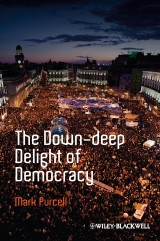Details

The Down-Deep Delight of Democracy
Antipode Book Series 1. Aufl.
|
20,99 € |
|
| Verlag: | Wiley-Blackwell |
| Format: | |
| Veröffentl.: | 23.01.2013 |
| ISBN/EAN: | 9781118295663 |
| Sprache: | englisch |
| Anzahl Seiten: | 184 |
DRM-geschütztes eBook, Sie benötigen z.B. Adobe Digital Editions und eine Adobe ID zum Lesen.
Beschreibungen
Arguing that the hegemony of the neoliberal/capitalist nexus must be challenged if we are to address the proliferating challenges facing our world, this inspiring book explains how democracy can revive the political fortunes of the left. <ul> <li>Explores issues central to the civil uprisings that swept the world in 2011, drawing profound connections between democracy and neoliberalism in an urban context</li> <li>Features in-depth analysis of key political theorists such as Gramsci; Lefebvre; Rancière; Deleuze and Guattari; and Hardt and Negri</li> <li>Advocates the reframing of democracy as a personal and collective struggle to discover the best in ourselves and others</li> <li>Includes empirical analysis of recent instances of collective action</li> </ul>
<p>Acknowledgments viii</p> <p>1 What Is to Be Done? 1</p> <p>2 What Democracy Means 29</p> <p>3 Becoming Democratic 75</p> <p>4 Becoming Active 92</p> <p>5 Revolutionary Connections 122</p> <p>6 Conclusion 143</p> <p>References 159</p> <p>Index 168</p>
<p>“Summing Up: Recommended. Upper-division undergraduate and graduate collections.” (<i>Choice</i>, 1 December 2013)</p> <p>“You can’t help but pick up a copy of <i>The Down-Deep Delight of Democracy</i> (DDDD) by Mark Purcell. The texture of its title – quadruple ‘D’ – and the promise of delight are irresistible. Its timely focus on democracy and the potential we have to <i>become</i> (more) democratic have much to offer critical geography. The idea that democratic futures can be grown from present democratic struggles and that as scholars we might contribute to this growth by recognizing and valuing them is especially important for future research agendas ... Purcell’s point is that people <i>are</i> finding their democratic strength in the world ... DDDD is a great start toward an examination of democratic possibilities.” (<i>Antipode</i>, 1 October 2013)</p> <p> </p>
<b>Mark Purcell</b> is Associate Professor in the Department of Urban Design & Planning at the University of Washington, USA, where he researches urban politics, political theory, social movements, and democracy. He is the author of <i>Recapturing Democracy</i> (2008) and numerous articles in journals including <i>International Journal of Urban and Regional Research, Urban Geography, Environment and Planning, Antipode, Urban Studies, Political Geography, Review of International Political Economy,</i> and <i>Planning Theory.</i>
This profound analysis explores issues central to the wave of civil uprisings that swept the world in 2011. Extending and deepening the author’s past analysis of the relationship between democracy and neoliberalism in an urban context, this volume explores democracy in greater theoretical depth. It works closely with the thought of key scholars in political theory including Friedrich Nietzsche, Antonio Gramsci, Henri Lefebvre, Jacques Rancière, Michael Hardt and Antonio Negri, and Gilles Deleuze and Félix Guattari. It discovers in their work a profound desire for democracy, a democracy in which we struggle individually and collectively to actively manage our own affairs. The arguments in this book go right to the heart of the challenge now facing the political left.
<p>‘This is an exceptional book. It is dense, closely reasoned, scholarly, indispensable as a reference, yet impassioned and oriented to practical political activity. It traces the history of democracy, its evolution in philosophy and in practice, and views democracy as a never-ending process, building on what exists, ever moving to what could be. It is a provocation both to thought and to action, aimed both at educators and Occupy activists.’—<b>Peter Marcuse</b>, Professor Emeritus of Urban Planning, Columbia University</p> <p>‘Mark Purcell criticizes neoliberals and neo-Keynsians alike as supporting oligarchy. He establishes democracy as a transcendent goal—but one that is a process always in a state of becoming, not an end point. Whether or not one agrees with him on the supremacy of democracy above all other ends, his views are challenging and enlightening.’—<b>Susan S. Fainstein</b>, Harvard University Graduate School of Design, USA</p>

















